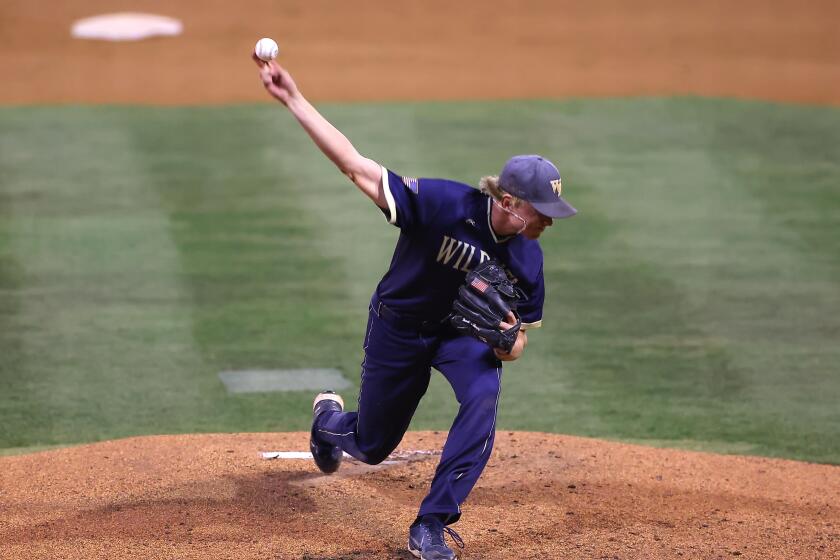COMMENTARY : CAL STATE NORTHRIDGE BASEBALL : The First Year in Division: Epilogue : Kernen Erred in Ordering Hide-and-Run Play After Loss
- Share via
Cal State Northridge baseball players were insulted Sunday, kicked in the chops when they already were down.
In all likelihood, too down to notice.
The Fresno State baseball team, which had just pushed over two runs in the bottom of the ninth inning to end Northridge’s season, was not responsible. Nor were the Bulldogs’ fiercely loyal fans, the Red Wave.
No, the Matadors were insulted by Coach Bill Kernen, one of their own.
Kernen, by all accounts, has done a fabulous job of forming a top-flight, major-college baseball team on a shoestring and a prayer. The season before Kernen became coach, Northridge posted a 22-33 record against mostly Division II competition. Against Division I teams, the Matadors won only two of 15.
In three years, times have dramatically changed. Northridge, 44-18-1, finished its first major-college season three outs shy of a berth in the College World Series. That is why it was a shame to see Kernen sequester his players in a locker room after Sunday’s loss, then herd them out a side door and onto a bus.
The players said they were under instructions not to answer questions.
This came as no surprise because Kernen was the only Northridge representative at a postgame press conference.
The NCAA requires that a team’s head coach and a minimum of two designated players be made available for questions after a 10-minute cooling-off period. The four other teams whose seasons ended during the regional adhered to this rule.
And when a Fresno writer asked if there was anything significant about the absence of Northridge players, he was roundly scolded.
“This wasn’t some Sunday picnic deal where you go out and play a little ball and lose a game in the bottom of the ninth after you play for nine months and spend thousands of hours practicing and put everything you’ve got, your heart and your guts and everything else on the line, and then come in and talk about it like it’s no big deal and it’s over,” Kernen snarled.
“If you’ve never been in a locker room when it’s like that, then you don’t know what I’m talking about.”
Listening to this, it came quickly to mind that players from San Diego State, the University of Portland, Stanford and Miami all had been in similar locker-room situations but somehow still showed up.
Shawn Purdy, the ace of Miami’s pitching staff, was called in after lasting only 11 batters in his start against Northridge, a 13-6 loss.
He was asked what happened. He said he made some mistakes and credited Northridge for taking advantage. He did not look happy. No one pretended as if he should be.
A few minutes after the Miami contingent left the room, the Northridge entourage arrived--coach with four players in tow. Winning is great publicity.
James W. Cleary, Northridge president, professes a great fondness for intercollegiate athletics.
Among his reasons are that student-athletes are immediately held accountable for their actions on--and sometimes off--the playing field. In this way, Cleary has said, college athletics imitates life.
Disappointment is a part of it.
Northridge players had good reason to be disappointed Sunday. If there were a few who were inconsolable, they had reason to be pardoned.
But if they didn’t want to talk, that should have been their decision--each of his own accord.
Scott Richardson, stopped when he ventured outside the locker room, answered a couple of questions before he was summoned back inside.
No one tried to embarrass him. Someone asked him a question he didn’t know how to answer. Quickly there was another not-so-pointed question.
Scott Sharts, who made a key error, walked out to call Richardson inside for a meeting. He was asked if he had a minute.
No problem, he said, just wait until after the meeting.
They had their meeting. Sharts came back outside. “I’d like to talk to you guys,” he said, “but I’m sorry, I just can’t. They don’t want us talking.”
No, they didn’t.
Sharts is 21. Old enough to vote. Old enough to drink. But not old enough or mature enough to answer a few questions?
They are wrong. Sharts is a class act and fully capable of making his own decision when it comes to whom he should, or be able to, talk to.
Sharts made an error and was willing to discuss it. He might even have guessed--correctly--that there would be other topics of conversation. Say, questions about a team and a player who bounded from oblivion into the Top 10 within the span of three seasons.
With any luck, somewhere down the line, Sharts will make another error worth asking about. Next time it might be in a World Series.
Next time there will be no one sheltering him. Next time he will handle it. He could have handled it Sunday. So could the vast majority of his teammates.
Ken Kendrena, got a second? “Sorry, they told us not to talk,” he said.
“They told us not to . . .” Never an “I can’t,” or a “Not now,” or simply a “No.” Always a sorry.
After all, reporters weren’t the only ones waiting for Northridge players to appear. So were family and friends.
Despite that--perhaps because of that--the team bus was moved and parked outside a more remote door.
Players filed outside, threw their equipment in the back of the bus and quickly took a seat. There were waves, but few words.
Northridge was leaving. All too quietly.
More to Read
Go beyond the scoreboard
Get the latest on L.A.'s teams in the daily Sports Report newsletter.
You may occasionally receive promotional content from the Los Angeles Times.











